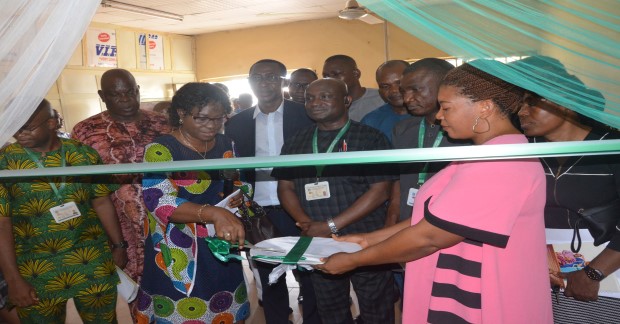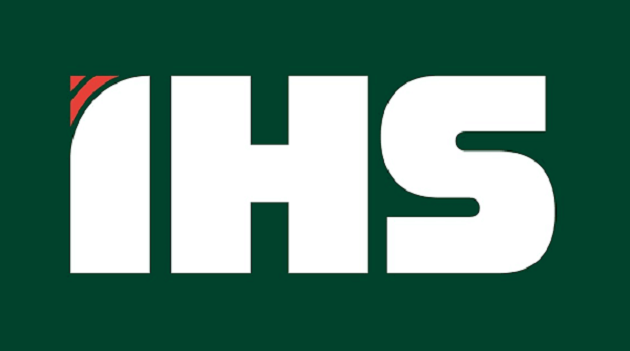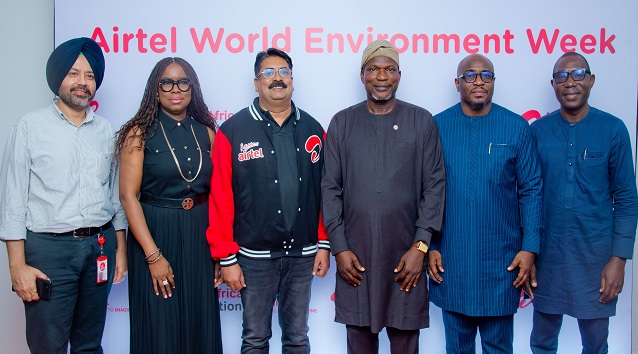News
Prof. Oge Elom, AE-FUNAI VC Commends NOTAP on IPR Promotion

Prof. Sunday Oge Elom, the Vice Chancellor of Alex Ekwueme Federal University Ndufu-Alike, Ikwo (FUNAI), Ebonyi State, has commended the National Office for Technology Acquisition and Promotion (NOTAP) for its role in creating Intellectual Property Rights (IPR) awareness in Nigerian knowledge institutions.

Professor Elom made the commendation at the Commissioning ceremony of Intellectual Property and Technology Transfer Office (IPTTO) established by NOTAP in AE-FUNAI.
He said that the commissioning of IPTTO in the institution was a clear demonstration of commitment by the Management of NOTAP and by extension, the Federal Ministry of Science, Technology and Innovation to stimulate innovative activities in the University.
He said that as a university, the school was irrevocably committed to academic excellence benchmarked on research and development (R&D) activities. He added that it was the desire of his administration to encourage and promote product-driven research geared towards providing solutions to the array of societal challenges.
The VC used the opportunity to express appreciation to the Honourable Minister of Science, Technology and Innovation, Dr. Ogbonnaya Onu for supporting the collaboration between the University and NOTAP, which according to him, gave birth to the establishment of IPTTO in the institute, in addition to the upgrading of the Chemical Engineering Laboratory.
He however, expressed hope that lecturers, researchers, inventors and innovators within the university environment and the southeast zone in general, will benefit from the Office in dealing with issues of copyrights and patents as regards their research and innovation ideas in a seamless manner.
Earlier in his opening remarks, Dr. DanAzumi Mohammed Ibrahim, the Director General of NOTAP, who was represented by the Director Corporate Planning department of NOTAP, Mrs. Idoreyin Imiyoho said that the Office was established to regulate the inflow of foreign technology into the country and at the same time, promote indigenous technologies.
The DG said that Nigeria has a weak intellectual property (IP) culture which according to him, the establishment of IPTTOs across Nigerian knowledge institutions is aimed to improve. He added that knowledge institutions are the hub for inventive and innovative activities therefore, there was need to create awareness on importance of IP to the socio-economic advancement of the Country.
Dr. Ibrahim stated that what distinguishes developed from developing countries was the quality of goods and services emanating from their research undertakings.
He added that the strength of nations was no longer measured by the amount of mineral resources but the level of human capital development. He urged researchers to engage more in demand-driven research that will attract venture capitalists rather than conventional research for the purposes of career progression.
He noted that the global ranking of Universities was based on the level of research outputs of such institutions and not necessarily the number of publications, adding that while it was important to share ideas through publications, researchers should as a matter of priority patent their inventions before publishing so as to reap financial benefits.
The DG used the avenue to preach for synergy between the academia and the industry, noting that research and development results can hardly metamorphous into goods and services without collaboration between the two bodies.
He reiterated that a lot of innovative activities in the knowledge industry end up on the shelve at prototype level due to insufficient awareness of the research works in the knowledge industry, adding that over dependence on imported raw materials by industries among others culminate into underdevelopment of this country.
News
IHS Nigeria Reaffirms Commitment to raising Nigeria’s Next Tech Giants from the Ilorin Innovation Hub

Telecommunications infrastructure provider, IHS Nigeria, has reiterated its commitment to transforming the Ilorin Innovation Hub into a leading destination for talent and technology development across North-Central Nigeria. The company envisions the Hub as a launchpad for future unicorns and a magnet for young innovators from Kwara State and the surrounding regions.

Speaking during a virtual town hall session organized by the Ilorin Innovation Hub with the theme “From Ilorin to the World: Building a Globally Recognized Technology Hub,”, Mr. Kazeem Oladepo, Senior Vice President & Chief Operating Officer of IHS Nigeria, emphasized the importance of collaboration, mentorship, and community engagement in nurturing the next generation of entrepreneurs.
“We see the Ilorin Innovation Hub as a platform to attract top talent—not just from Ilorin, but from across the region’s tertiary institutions and tech ecosystem,” Oladepo said. “This is an opportunity to build globally impactful companies by harnessing local brilliance with global insight.”
Mr. Temi Kolawole, Managing Director/CEO of the Ilorin Innovation Hub, described the town hall as a homecoming for top minds with roots in Kwara State.
“This is a convergence of visionaries—people who’ve built, scaled, and invested in world-class companies—now giving back to shape a collective future,” Kolawole said. “Our partnership with IHS Nigeria exemplifies what’s possible when public sector ambition meets private sector expertise.”
Responding to a participant’s question on how individuals could contribute towards the growth of the hub, Mr. Oladepo encouraged industry experts present to engage directly with the Hub’s program managers – future Africa and Cc-Hub, provide mentorship, and help in aligning the training modules with local and global market realities.
“IHS is already investing financial, technical, and intellectual resources into the Hub. But to truly thrive, we need champions within the ecosystem—mentors who’ve built real businesses—to guide young people as they develop transformative ideas,” he noted.
Highlighting long-term sustainability, Oladepo called for the inclusion of successful professionals and entrepreneurs in the Hub’s activities to ensure relevance and adaptability.
“Let’s bring in those who’ve succeeded in fields like e-commerce, logistics, Healthtech, and Data Mining. Their insights can help refine the Hub’s programs and ensure participants extract real value,” he added.
Other speakers at the session included Ms. Anu Adasolum, Founder & CEO of Sabi, and Mr. Chris Folayan, Founder of Founder Centered. The virtual townhall was well attended with participants including tech enthusiasts, founders, startups drawn from both within and outside Nigeria.
News
Airtel Nigeria Promotes World Environment Day with Nationwide Sustainability Activities

Telecommunications provider, Airtel Nigeria has reaffirmed its commitment to environmental sustainability with a nationwide campaign to combat plastic pollution in commemoration of World Environment Day 2025.

Themed “Ending Plastic Pollution”, this year’s events demonstrated the corporate mission of Airtel to champion environmental stewardship.
Tagged #UnPlasticAfrica, the company’s campaign began on June 3, mobilizing employees across six operating regions for a week of education, advocacy, and cleanup activities aimed at promoting sustainable living, in alignment with global efforts to reduce plastic pollution.
The activities kicked off with a Sustainability Seminar, led by Dr Hassan A. Sanuth, Director of Sanitation Services at the Lagos State Ministry of the Environment and Water Resources, and focused on the role of the individual in reducing plastic waste while promoting practical recycling habits.
Following this educational session, all Airtel Nigeria employees took the “Eco Pledge” to commit to reusable containers.
In his remarks at the seminar, Chief Executive Officer of Airtel Nigeria, Dinesh Balsingh, reaffirmed Airtel`s dedication to sustainability.
“As we invest in Nigeria’s digital future, we are equally committed to protecting the environment that sustains us. From AI-powered services that reduce paper use to partnerships that connect rural areas without environmental disruption, we are embedding sustainability into every layer of our operations,” he said.
Speaking at the workshop, Dr. Sanuth emphasized the urgency of addressing the plastic pollution crisis, particularly in urban centers like Lagos.
“Plastic waste is choking our drains, polluting our water bodies, and threatening public health. Every little action counts, from individuals making conscious choices to organizations taking bold steps and together, our collective efforts can make a significant impact in ending plastic pollution,” he noted.
He also highlighted the dangers of plastic waste, noting that microplastics have been traced in food, water, and even human blood and called for stronger policies and corporate accountability.
The highlight of the week was a market clean-up and sensitization drive held by Airtel employees in Abuja, Oyo, Benin, Enugu, and Kano. Airtel staff volunteers, in collaboration with local partners, led plastic collection efforts, conducted environmental hygiene training, and distributed over 3,000 branded reusable bags and parasols to market vendors and shoppers.
The World Environment Day campaign, nicknamed Earth Fest 2025, is part of Airtel Nigeria’s broader CSR Strategy, which continues to integrate environmental stewardship into its organizational practices.
News
NOTAP Boss Laments Loss of IPR by Nigerian Researchers

Dr. Obiageli Amadiobi, director general, National Office for Technology Acquisition and Promotion (NOTAP), has expressed displeasure over the level of Intellectual Property Right (IPR) losses by Nigerian researchers due to insufficient knowledge of the benefits of IPR protection.

Speaking at a one-day Coordinator’s Forum organized by the Office in Uyo for the South-South geopolitical zone of the country, the Director General, represented by Mrs. Caroline Anie-Osuagwu, director of Technology Acquisition and Research Coordination (TARC) department, said that prior to the establishment of the Intellectual Property and Technology Transfer Offices (IPTTOs) in Nigerian knowledge establishments, Nigerian researchers had no deep knowledge of the importance of IP protection, hence losing their IP rights.
In a statement signed by Raymond Onyenezi Ogbu for the head, Public Relations and Protocol Unit of NOTAP, the DG advised researchers to always file for a patent each time they anticipate a breakthrough and avoid publishing before patenting, as any research work published in a paper is already in the public domain and can no longer be patented.
“IP rights are rights granted to a researcher or inventor by the government to have a monopoly over the financial exploitation of their inventions for a period of time to recoup the expenditure on their research undertaking”. the DG said.
She challenged patent owners to license or commercialize their inventions, adding that patents that cannot metamorphose into tangible products and services are not worth keeping, as they are liabilities to the owners.
The DG said that researchers with patented inventions can license their invention for royalty purposes or sell them outrightly to venture capitalists if they cannot commercialize.
“Over the years, the nation has depended on the consumption of products from foreign research, while Nigeria is blessed with skilled human resources but only needs to be strategic in their research understanding”.
“The aim of organizing the IPTTO coordinator’s forum was to interact with the coordinators, know their challenges and achievements, and encourage the centers that are not very progressive to strengthen their centers.” She added.
The DG stressed that while a number of centers are performing well, some are struggling to find their fit, occasioned by bureaucratic bottlenecks.
She expressed confidence in the ability of the research communities engaging in demand-driven and market-driven research to fast-track development adding that technology development is a product of research work, and knowledge institutions are duty-bound to engage in critical research to advance the IPR ecosystem in Nigeria.
Participants from the South-South Zone took turns to commend NOTAP for the impactful program and requested the Office to assist them with links to venture capitalists for the commercialization of their research results.
All the IPTTO coordinators presented their scorecards and were advised to get ready for the 2026 IPTTO ranking that would be organized by the Office.

 Telecom2 days ago
Telecom2 days agoAirtel Recommits to Fraud Prevention after NCC’s N104m Fine for SIM Registration Breaches

 E-Financial3 days ago
E-Financial3 days agoPalmPay Seeks $100m Funding Round

 Telecom2 days ago
Telecom2 days agoMTN’s Female Leadership Surges to 41.4%, Doubles Industry Average

 Telecom3 days ago
Telecom3 days agoAnambra Cracks Down on Illegal ISPs, Cites Security, Service Concerns

 News3 days ago
News3 days agoFBI Busts Alleged Cyber Fraud Ring Led by Nigerian ‘Tech Queen’

 E-Business3 days ago
E-Business3 days agoNIMC Denies Blocking Police Commission from Verification Server

 News3 days ago
News3 days agoNOTAP Boss Laments Loss of IPR by Nigerian Researchers

 Broadcasting2 days ago
Broadcasting2 days agoNCC Warns DJs: Playing Music Without License Could Lead to 5-Year Jail Term

























